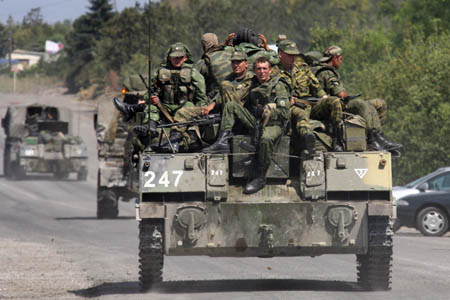Russia has kept moving troops out of Georgia and strived to fulfill its promise in a cease-fire agreement of withdrawing its forces from the Caucasus neighbor after several days of military conflicts.
Russia withdraws troops
All the troops will pull back to Russia's territory in ten days, Russian General Vladimir Boldyrev, the Chief Commander of Ground Troops said Thursday.
 |
|
Russian troops and armored vehicles pull out from the city of Gori, Georgia, August 18, 2008. |
Peacekeepers' posts would open on Friday and Russian troops that are not involved in peacekeeping operations would return to Russia, Boldyrev said.
Georgia launched attacks in its breakaway region of South Ossetia on Aug. 8 in an attempt to regain control of the region that borders Russia.
Tbilisi's move triggered prompt reaction from Moscow, whose troops drove Georgian forces out of the region and took parts of Georgian territory.
Russia has promised to withdraw its troops, except peacekeeping forces, on Friday in a French-brokered cease-fire deal but the West has accused Moscow of moving slowly.
Moscow-West ties soured
Military cooperation between Russia and NATO, whose membership is being pursued by Georgia, have been frozen after the conflict.
Russian-U.S. relations were also deteriorating due to the Russian-Georgian conflicts and a U.S.-Poland agreement of deploying anti-ballistic missile components in Poland, a move Moscow regarded as a threat to its national security.
Georgia and the United States will continue defense cooperation, Georgian President Mikhail Saakashvili said on Thursday.
Georgia, jointly with Pentagon and NATO representatives, is discussing concrete issues in order to strengthen the country's defense capacity, said the president.
Washington is to help Georgia rebuild its military following the conflict with Russia over South Ossetia, said Supreme Allied Commander Europe General John Craddock, also NATO's top operational commander who is visiting Tbilisi.
Showcase of flexibility
There are, however, a showcase of flexibility amid the rows.
"We are not in the mood of slamming the door shut," said Russian Foreign Minister Sergei Lavrov.
"Russia needs bilateral cooperation to a no greater degree than NATO. I believe that our NATO partners need support from Russia, including that for its operation in Afghanistan, and to a far bigger extent," Russian media quoted the top diplomat as saying.
The Russia-led Collective Security Treaty Organization also said on Thursday that it's still open to cooperation with NATO "as any contacts with that organization would help solve a series of major problems."
But on the same day, mass rallies were held in South Ossetia and Georgia's another breakaway region of Abkhazia, urging Russia to recognize the self-proclaimed republics as independent states.
Abkhazia and South Ossetia broke away from Georgia's central rule in the 1990s following the collapse of the former Soviet Union. But their self-proclaimed independence is not internationally recognized.
(Xinhua News Agency August 22, 2008)